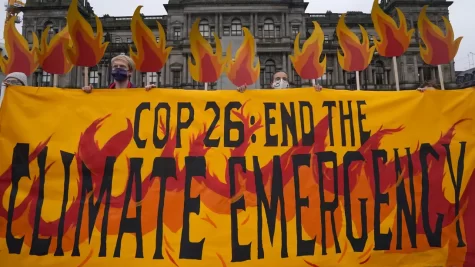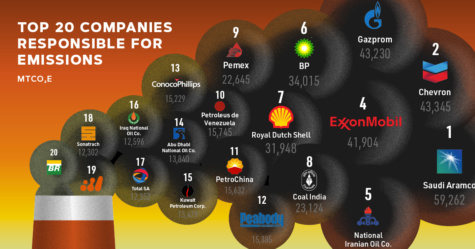
Reaghan Mulligan | Newsroom Manager
November 5, 2021
With recent highlights of climate concerns, and even greater pushes for unified action by environmental activists across the globe, the ticking time bomb of inaction buries itself in the near future. Although climate change spokespeople have been warning world leaders about the vital need for resuscitation and recreation of environmental protection regulations, most countries may have reacted with too little too late.
As the 26th Climate Convention, or COP26, moves forward through November 12, world leaders and powerful corporations alike plan to accumulate and enforce strategic actions to combat climate change and solidify goals set at the 2015 Paris Agreement.
Ironically, critics amassed as world leaders made their way to Scotland in order to discuss the environmental stability of the future. Particularly, the public—and the media—focused on each individuals’ means of transportation to attend the COP26 conference, most commonly found in the form of privatized charter jets.
Critical news articles targeted British Prime Minister Boris Johnson, after recognizing the distasteful contrast between Johnson’s fleeting words of warning on the limited time left to reverse humanity’s effects on the environment and his immediate return to London on a fuel-guzzling private jet.
While spokespeople for a multitude of world leaders defended each individual’s decisions to return to their home country on chartered planes—given that many of the jets relied on carbon efficient fuel that produced significantly less emissions than other planes of similar size—the personal actions of global climate representatives come with a metallic taste of hypocrisy.
As United Nations executives return home from the Climate Convention on private jets, likely followed by motorcades, everyday citizens received lectures on changes they can make to reduce their carbon footprint. Albeit the importance of every individual taking part in efforts to curb their carbon footprint holds strong, the respective efforts of offering climate preservation tips must begin to relocate to new audiences.
“I do my best to reduce my use of single-use plastics,” senior Bethany Padilla said. “But ultimately, it is not my responsibility for the planet’s destruction.”
Even then, the world leaders may not receive the full extent of encouragement to take action against climate change. While their public behaviors are unarguably vital, their individual performance—similar to the unsustainable everyday conduct of many citizens—accumulate less emissions than large corporations, whose actions contribute to more than 70 percent of carbon emissions, yet still remain largely unregulated.
“In the end, our government and global leadership must begin intensive economic intervention,” Padilla added, referencing the ways in which even extensive action by the citizens cannot fully eliminate human impacts on the environment, as the most prevalent influence on the exponentially increasing emissions lies in the hands of large corporations.

Foreign oil and gas industries produce the highest levels of carbon emissions, with China alone being responsible for 14.3 percent of global emissions and Saudi Arabia following with a total emission rate of 4.5 percent. With only about 100 companies, including big-name corporations such as Chevron Corp, producing almost three-quarters of the world’s greenhouse gas emissions, the vital need for a reconsideration of who receives carbon conservation tips is blatant.
Such corporations spend millions of dollars on lobbying and soft money donations to political parties in the United States, making the lack of regulation unsurprising, as limiting these super-companies would likely decrease the donations from each respective Political Action Committee (PAC). The hold that global businesses reign over policy-makers with the ability to enforce climate-related legislations restricts the universal placement of actions to reverse human-caused greenhouse gas emissions, thus making it all the more difficult to conserve the environmental vitality of the globe.
Suggestions offered to corporations are few, and most even target employees of these businesses and their impact, rather than generally pushing for conserving energy, choosing more sustainable means of production, and other methods targeting the large scope of corporate carbon footprints. Rather than encouraging workers to take the bus, over a car, to work, websites and environmental activists could suggest the increased production of recyclable or biodegradable materials and urge corporations to provide transparency on their carbon footprint. Just as any and all efforts from citizens to reduce their everyday carbon footprint influence the future of the environment, even small moves towards forms of sustainability from large businesses could leave lasting impacts on the furtherance of environmental sustainability.
At the same time, targeting the consumer is in no way illogical, as acts of boycotting and direct lobbying of globalized economic corporations allows individuals to leave a lasting influence on the company. “[Corporations] are very dependent on the demand for their items; so emphasizing alternatives to the corporations seems the most logical and rational,” senior Nicole De Santos said.
Undeniably, the sole cause of climate change has a nuanced answer, and no single individual bears the weight of creating excessive carbon emissions. However, the all too common rhetoric that focuses exclusively on the consumer, rather than the producer, has the potential to reach new, larger audiences with a monopoly over the end results of society’s impact on the environment.

Leave a Reply